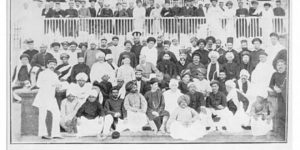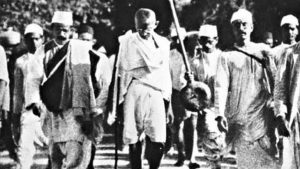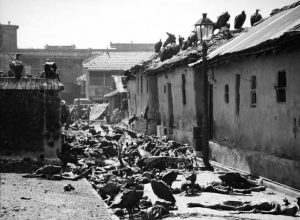Abstract
The main objective of my research is to find the role played by the Indian National Congress during the partition. On fundamental concepts, Most people think All India Muslim League collectively and Muhammad Ali Jinnah individually liable for this separation. So, INC is thrown in a safe zone. But currently, the dispute is praised about the INC’s actions during the partition. The general public is thinking about the liability of INC in the tragic separation. In my research, I also try to find how Indian Muslims are discriminated in socially, educationally, and economically, How the demand for a Muslim homeland in India arises, and how INC ideology comes far away from Gandhism during the partition of India. I also work on the role of Jawaharlal Nehru and Sardar Patel during the Bengal Partition.
Indian civilization was one of the oldest civilizations in the world. Civilization had started in India before Europeans became civilized. In the long history of India, it was invaded by several foreign powers. Firstly, Aryan began to infest India. Greeks and Mongols also invaded this land. Besides, in the medieval period, a large part of India was ruled by the Muslim rulers. Mughals had unified India after 1500 years. The modern history of India started when British rule had begun. During the British period, government institutions were modernized according to European style. They started legislation practice in India. Moreover, They emerged the political party. British established the Indian National Congress for their benefit. It was created as an elite level party by British rulers.

The Indian National Congress established its first session in Bombay from 28– 31 December 1885 by a resigned Civil Service officer Allan Octavian Hume. In 1883, Hume had sketched out his thought for a body speaking to Indian interests in an open letter to alumni of the University of Calcutta. Its point was to get a more special offer in government for educated Indians. The first purpose of this party was used for the interaction between the elite level Indian and British government. Soon, Congress became an elite level to the mass level party (Singh, 2017) After that, Congress envision its secular ideology. But Muslim leaders were claimed about the discriminating conception of the Indian National Congress against Muslims. At the same time, the swadeshi movement was started in India. INC supported the campaign. Thus, the movement turned into a radical motion. They attempted to kill the British officials. In that movement, they began to sing Vande Mataram as a national slogan, which had the conflict of the basic principles of Islam and a symbol of polytheism (Bhattacharya, 2020). As a result, Muslims formed their political party named “All India Muslim League” in 1906 at Dacca after the first partition of Bengal. But they did not demand a Muslim homeland in India in their first phase of the campaign.

When M. K. Gandhi arrived in India from South Africa in 1915, He influenced INC heavily. His non-violence movement became popular. After that, Gandhi’s non-cooperation movement and khilafat movement joined together the Hindus and the Muslims. They started the campaign together. It was a substantial obstacle for the British rulers. However, There was violence that occurred in a police station. On 4 February 1922, people fired in a police station at Chauri Chaura in United Provenance. They killed 22 police officers by fire (Gopalakrishnan, 2019). Gandhi stopped the movement’s purpose of violence. He said that India was not prepared for its independence. It was shocking news for the Muslim community. Then, most Muslim leaders left INC, including Jinnah. In the decade of thirty, some of the Muslim students of Cambridge University fantasized about the demand of the Muslim homeland in India. On 23 March 1940 Muslim League passed the Lahore resolution; it prioritized establishing a Muslim state in India rather than independent India. Besides, on 16 August 1946, Jinnah called direct action day in Calcutta. It started mass killing in that city.

More than 4000 people were killed on that day. Historians specified the day as the great Calcutta killings. Later, riots spread all over India, such as Noakhali, Bihar, Lahore, Bombay, etc (Sundarsan, 2019). British rulers decided to divide India. Furthermore, the concerns praised about Bengal and Punjab would be divided or united. Huseyn Shaheed Suhrawardy and Sarat Chandra Bose intended to make a united Bengal. They told their proposal to the British. British replied whatever they did; it would be the agreement of the Indian National Congress and All India Muslim League. Muslim League agreed about the united Bengal proposal. But INC was strictly opposed by the leadership of Jawaharlal Nehru and Sardar Patel. Gandhi hardly agreed to the partition of India. At the same time, his influence in INC was reduced. The party high command decided the partition. It had been told that the Congress leader did it for their personal political benefits. They did not compromise to share the power with the Muslim League. At the period, the Muslim representative was very low in INC except for Abul Kalam Azad and Abdul Ghaffar Khan. In the 1946 Indian provincial elections, Congress won the elections even in Muslim majority States. They did not use this basis during negotiation with the British. A referendum was taken place in Frontier Provenance on the questions of the partition of India. Congress did not take any steps to win the election.
read more India’s Response to South Asian Regionalism
On the other hand, Syama Prasad Mukherjee incitement the Hindus for the partition of Bengal. So the United Bengal proposal did not come to a reality. Finally, the British divided Bengal into two parts Muslim majority East Bengal and Hindu majority West Bengal. In 1905 Hindus were heavily opposed to “Bangavanga,” but in 1947, Hindu supported the partition of Bengal (Chowdhury, 2017).
Indian National Congress is the oldest political party in India. This party played a vital role in the independent struggle of India. However, they had some controversial activity during the partition. This party always visualized their secular idiosyncrasy. Sometimes, they failed to show in essentially. For that reason, most Muslim leaders left Congress. Finally, during the partition, they were unable to compromise with the Muslim League. This stand was one of the main reasons for the division of thousands of years old civilization, coexistence, diversity, and pluralistic society in India.
Md. Rony Hasan Undergraduate Student, North South University Email: [email protected]
References
Sundarsan, V. ( 2019, December 11). Congress and Partition. The Hindu. Chennai, Tamil Nadu. India. Retrieved from https://www.thehindu.com/opinion/op-ed/congress-and-partition/article30270109.ece
Bhattacharya, S. ( 2020, September 30). Hindutva and idea that ‘Hindus are in danger’ were born in Bengal. The Print. India. Retrieved from https://theprint.in/pageturner/excerpt/hindutva-and-idea-that-hindus-in-danger-born-in-bengal/513174/
Ayoob, M. (2017, October 19). Gandhi’s Role in the Partition of India. Foreign Affairs. Foreign Relations Inc. Retrieved from https://www.foreignaffairs.com/articles/south-asia/2017-10-19/gandhis-role-partition-india
Firey Dekha ’47. (2017, October 11). Deepto Documentary. Kazi Media Limited. Dhaka, Bangladesh. Retrieved from https://youtu.be/D85v2BqPtp4
Singh, K. (2017, December 5). Indian National Congress: From 1885 till 2017, a brief history of past presidents. The Indian Express. New Delhi, India. Retrieved from https://indianexpress.com/article/india/here-is-a-list-of-past-presidents-of-indian-national-congress-4967084/
Gopalakrishnan, A. (2019, September 30). Why Mahatma Gandhi rejected Chauri Chaura’s crime of passion. The Times of India. India. Retrieved from https://timesofindia.indiatimes.com/why-mahatma-gandhi-rejected-chauri-chauras-crime-of-passion/articleshow/71372232.cms
Chowdhury, A. (2017, August 27). 1947 and Bangladesh: The third unknown history. The Indian Express. New Delhi, India. Retrieved from https://indianexpress.com/article/opinion/1947-and-bangladesh-the-third-unknown-history-partition-pakistan-4815434/

Best view i have ever seen !
excellent and also incredible blog. I really intend to thank you, for offering us better information.
Every weekend i used to pay a visit this web site, because i want enjoyment, for the
reason that this this site conations truly good funny information too.
Wow, superb blog layout! How long have you been blogging for?
you make blogging look easy. The overall look of your website is great, as well as the content!
Hi there, of course this article is really good and I have learned lot of things from it concerning blogging.
thanks.